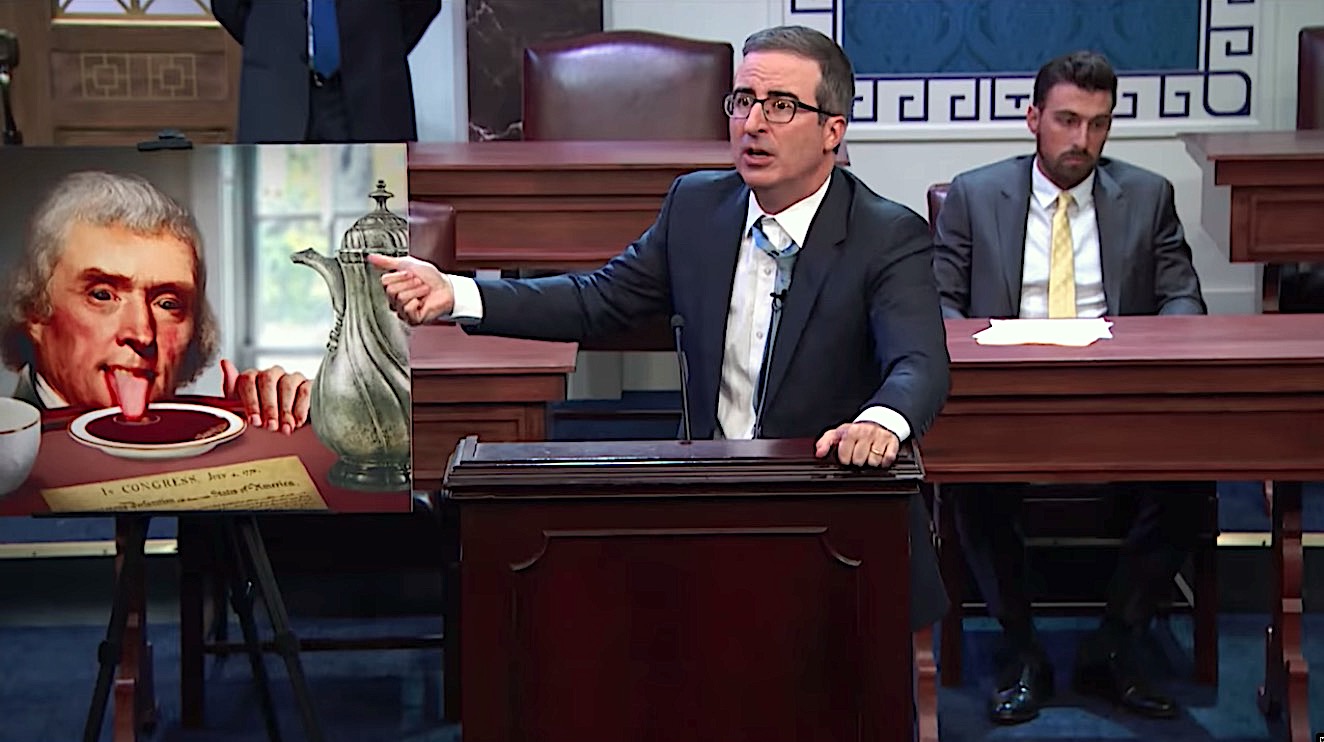Watch John Oliver try to convince you it's time to kill the filibuster. It's very dramatic.


A free daily email with the biggest news stories of the day – and the best features from TheWeek.com
You are now subscribed
Your newsletter sign-up was successful
Democratic presidential hopefuls are making "big promises about the fabulous bills candidates will sign when they're elected," John Oliver said on Sunday's Last Week Tonight. But they probably won't, "because they'd have to go through the Senate," which is currently "a giant nonfunctioning roadblock." The Senate's "low level of production is likely thanks to one incredibly annoying legislative tool — not actually this tool," he said, showing a photo of Senate Majority Leader Mitch McConnell (R-Ky.), "although he is certainly at fault. I'm referring to the filibuster."
The filibuster, or "any tactic aimed at blocking a measure by preventing it from coming to a vote," has "often been presented in TV and movies as a heroic act, like when Jimmy Stewart talked himself to exhaustion in Mr. Smith Goes to Washington," but "the modern filibuster is nothing like the Jimmy Stewart version," Oliver said. "It's become an overused tool of obstruction." Because any legislation now needs 60 votes to pass, he said, "theoretically, senators from the 21 least populated states, representing just 11 percent of Americans, could overrule everyone else. Which seems pretty extreme."
"To recap the main arguments in favor of the filibuster: We've always had it (no, we haven't); it enables debate (no, it doesn't); it protects minorities (not the ones you're thinking of); it encourages bipartisanship (not even close)," Oliver said. "It has become so difficult to pass a law, the big issues of our day are now being handled by other branches of the government," notably via executive action or court rulings. Killing the filibuster "is undeniably a gamble," since your side won't always have power, "but personally, I have come around to thinking it is a risk worth taking," he said. "The Senate is supposed to address America's problems, and the filibuster is making it basically impossible for them to do that." To convince risk-averse skeptics, Oliver turned to "the exact kind of big, stupid speech that I hate." Watch him "filibuster the filibuster" below (if you don't mind NSFW language). Peter Weber
The Week
Escape your echo chamber. Get the facts behind the news, plus analysis from multiple perspectives.

Sign up for The Week's Free Newsletters
From our morning news briefing to a weekly Good News Newsletter, get the best of The Week delivered directly to your inbox.
From our morning news briefing to a weekly Good News Newsletter, get the best of The Week delivered directly to your inbox.

A free daily email with the biggest news stories of the day – and the best features from TheWeek.com
Peter has worked as a news and culture writer and editor at The Week since the site's launch in 2008. He covers politics, world affairs, religion and cultural currents. His journalism career began as a copy editor at a financial newswire and has included editorial positions at The New York Times Magazine, Facts on File, and Oregon State University.
-
 Why are election experts taking Trump’s midterm threats seriously?
Why are election experts taking Trump’s midterm threats seriously?IN THE SPOTLIGHT As the president muses about polling place deployments and a centralized electoral system aimed at one-party control, lawmakers are taking this administration at its word
-
 ‘Restaurateurs have become millionaires’
‘Restaurateurs have become millionaires’Instant Opinion Opinion, comment and editorials of the day
-
 Earth is rapidly approaching a ‘hothouse’ trajectory of warming
Earth is rapidly approaching a ‘hothouse’ trajectory of warmingThe explainer It may become impossible to fix
-
 ‘One Battle After Another’ wins Critics Choice honors
‘One Battle After Another’ wins Critics Choice honorsSpeed Read Paul Thomas Anderson’s latest film, which stars Leonardo DiCaprio, won best picture at the 31st Critics Choice Awards
-
 A peek inside Europe’s luxury new sleeper bus
A peek inside Europe’s luxury new sleeper busThe Week Recommends Overnight service with stops across Switzerland and the Netherlands promises a comfortable no-fly adventure
-
 Son arrested over killing of Rob and Michele Reiner
Son arrested over killing of Rob and Michele ReinerSpeed Read Nick, the 32-year-old son of Hollywood director Rob Reiner, has been booked for the murder of his parents
-
 Rob Reiner, wife dead in ‘apparent homicide’
Rob Reiner, wife dead in ‘apparent homicide’speed read The Reiners, found in their Los Angeles home, ‘had injuries consistent with being stabbed’
-
 Hungary’s Krasznahorkai wins Nobel for literature
Hungary’s Krasznahorkai wins Nobel for literatureSpeed Read László Krasznahorkai is the author of acclaimed novels like ‘The Melancholy of Resistance’ and ‘Satantango’
-
 Primatologist Jane Goodall dies at 91
Primatologist Jane Goodall dies at 91Speed Read She rose to fame following her groundbreaking field research with chimpanzees
-
 Florida erases rainbow crosswalk at Pulse nightclub
Florida erases rainbow crosswalk at Pulse nightclubSpeed Read The colorful crosswalk was outside the former LGBTQ nightclub where 49 people were killed in a 2016 shooting
-
 Trump says Smithsonian too focused on slavery's ills
Trump says Smithsonian too focused on slavery's illsSpeed Read The president would prefer the museum to highlight 'success,' 'brightness' and 'the future'
